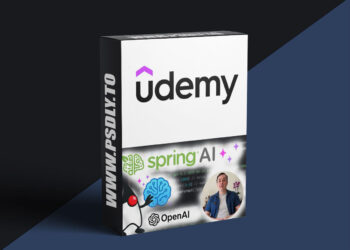| File Name: | Data Science Career Path: 100 Days of Data Science Bootcamp |
| Content Source: | https://www.udemy.com/course/data-science-career-path-100-days-of-data-science-bootcamp/ |
| Genre / Category: | Programming |
| File Size : | 17.5 GB |
| Publisher: | udemy |
| Updated and Published: | May 28, 2025 |
What you’ll learn
- Understand the foundations of data science, its applications, and the step-by-step process to become a data scientist.
- Analyze data using Python programming, from variables and data types to loops, functions, and object-oriented concepts.
- Apply statistical and probability concepts, including distributions, hypothesis testing, and inferential analysis using Python.
- Perform data cleaning, transformation, and exploratory data analysis with real-world datasets using pandas and NumPy.
- Visualize data effectively with Python, creating bar charts, histograms, scatterplots, heatmaps, box plots, and more.
- Learn essential maths and Build machine learning models for regression, classification, and clustering using scikit-learn and evaluate them properly.
- Master advanced ML techniques like cross-validation, feature engineering, regularizations, and hyper-parametertuning.
- Implement popular ensemble learning methods including Random Forest, AdaBoost, CatBoost, LightGBM, and XGBoost.
- Explore deep learning using neural networks and TensorFlow, from data preprocessing to model evaluation.
- Use real-life projects and assessments to gain hands-on experience and build a strong portfolio for the data science field.
Welcome to “Data Science Career Path: 100 Days of Data Science Bootcamp,” a uniquely structured, intensive, and comprehensive journey designed for anyone who is truly committed to becoming a complete, job-ready data scientist — regardless of your current background, prior experience, or academic history.
Why This Course Matters
However, most learners struggle with fragmented resources, inconsistent guidance, or theory-heavy content that doesn’t build real competence. This course solves that problem. It’s structured to provide step-by-step, cumulative, and daily progress — helping you turn knowledge into capability, and capability into career readiness.
What You Will Learn – A Deep Dive into the 100-Day Journey
This 100-day course is not a surface-level overview — it is a professionally structured roadmap that builds your knowledge, skillset, and intuition in data science layer by layer. It follows a real-world, practical-first philosophy using a powerful credit fraud dataset and a series of structured learning blocks, gradually introducing you to the entire landscape of data science.
Each day you’ll dive into detailed, guided lessons and hands-on coding tasks that mirror the daily work of real data scientists. Below is an in-depth look at what you will master during this journey:
#______Foundations of Data Science and Python Programming
In the early days of the challenge, you will build a rock-solid foundation. You will learn how to think like a data scientist — not just how to write code.
- Python fundamentals for data analysis: variables, loops, conditionals, and functions.
- Working fluently with data structures like lists, dictionaries, tuples, and sets.
- Writing clean, modular, and reusable code for analysis workflows.
- Importing and handling real-world datasets using pandas and NumPy.
- Understanding data types, memory optimization, and performance tuning in data frames.
#______Exploratory Data Analysis (EDA) – Finding Meaning in Raw Data
One of the most essential phases in any data science project is EDA, and this course gives you deep, repeated exposure to it.
- Understanding the shape, patterns, and essence of raw data.
- Detailed feature-level insights: examining distributions, skewness, and outliers.
- Using advanced pandas operations to group, filter, aggregate, and reshape data.
- Visualizing univariate, bivariate, and multivariate relationships using:
- Seaborn (histograms, pairplots, heatmaps)
- Matplotlib for custom visualizations
- Developing data intuition: asking the right questions and forming hypotheses based on patterns.
- Cleaning and preprocessing datasets: handling missing values, outliers, duplicates, and inconsistent formats.
#______Probability and Statistics for Data Science
You will not just memorize formulas — you’ll understand the mathematical foundations that drive machine learning and data analysis.
- Understanding probability distributions, including:
- Normal, Binomial, Poisson, Exponential, and Uniform distributions
- Learning descriptive statistics: mean, median, mode, range, variance, standard deviation.
- Grasping inferential statistics: confidence intervals, hypothesis testing, and p-values.
- Performing chi-square tests, t-tests, and ANOVA to validate insights from data.
- Learning how to interpret real statistical results and translate them into actionable business decisions.
#______Essential Mathematics for Data Science – Building Intuition from Numbers
Mathematics is the language behind machine learning algorithms, and this course ensures you’re not just applying models blindly, but truly understanding how and why they work. Throughout the journey, you will build a step-by-step understanding of the most essential mathematical concepts that drive every data analysis and prediction task.
- Linear Algebra Essentials:
- Vectors, matrices, and operations like dot product, transpose, and inverse.
- How linear algebra powers models like Linear Regression and Principal Component Analysis (PCA).
- Matrix representation of datasets and transformations.
- Calculus Fundamentals:
- Understanding how optimization works through derivatives and gradients.
- The core role of partial derivatives in training machine learning models via gradient descent.
- Intuition behind loss functions, slope, curvature, and convergence.
#______Machine Learning – Building Predictive Models from Scratch
You’ll progressively build your machine learning knowledge from beginner to intermediate level, applying algorithms directly to your dataset.
- Understanding the complete machine learning workflow:
- Splitting data, preprocessing, training, validating, and testing.
- Applying key classification and regression algorithms including:
- Logistic Regression, Decision Trees, Random Forests, K-Nearest Neighbors, and Naive Bayes
- Handling class imbalance using techniques like SMOTE and stratified sampling.
- Learning model evaluation techniques:
- Accuracy, precision, recall, F1-score, ROC-AUC, and confusion matrices.
- Understanding bias-variance tradeoff and overfitting vs underfitting.
- Building explainable models and interpreting feature importance.
#______Feature Engineering – Creating Smart Inputs for Models
You’ll learn how to craft and transform your dataset to feed machine learning models more meaningfully.
- Identifying irrelevant or redundant features.
- Creating new derived variables based on domain knowledge.
- One-hot encoding, label encoding, and dealing with categorical features.
- Scaling, normalizing, and transforming numerical features.
- Building pipelines for preprocessing and ensuring reproducibility.
#______Model Improvement and Evaluation
Knowing how to tune and refine your models separates the amateurs from the pros — this course will guide you in doing that with both rigor and creativity.
- Cross-validation techniques (k-fold, stratified k-fold).
- Hyperparameter tuning using GridSearchCV and RandomizedSearchCV.
- Understanding and interpreting learning curves.
- Model selection strategies based on metrics and business needs.
#______End-to-End Projects – Real-World Case Studies
You’ll work on fully guided real-world projects, simulating a professional data scientist’s workflow from raw data to presentation.
- Tackling a credit card fraud detection project with end-to-end model deployment.
- Documenting the entire process: from EDA, modeling, tuning, and result communication.
- Learning how to turn Jupyter notebooks into professional portfolios and reports.
- Building storytelling skills to communicate your findings effectively to both technical and non-technical audiences.
#______Data Science Thinking and Soft Skills
Throughout the course, you’ll build the mindset and habits of a data scientist, including:
- Asking smart, analytical questions to understand business problems.
- Building the patience to debug, iterate, and refine solutions.
- Writing clear code comments and documentation.
- Practicing daily to build resilience and problem-solving speed.
How This Course Will Transform You
If you stay disciplined and follow this 100-day roadmap, you will go from having no prior knowledge to being able to:
- Confidently work with real datasets and perform independent analysis.
- Build, tune, and deploy machine learning models in real-world scenarios.
- Understand the mathematical foundations of key data science methods.
- Create a project portfolio that is worthy of job interviews and freelance opportunities.
- Speak the language of data fluently and contribute to data-driven decisions in any team.
- Qualify for entry-level to intermediate roles in data science, ML engineering, or analytics.
This is not just a course — it’s a full transformation path, packed with actionable skills and confidence-building assignments.
Why a 100 Days Challenge?
Great skills are not learned overnight — they are built over consistent, focused effort. The 100 Days Challenge approach helps you:
- Develop daily habits of learning and problem-solving.
- Avoid burnout by following a structured pace.
- Build discipline and accountability through a clear daily path.
- Cultivate incremental mastery — where every concept and tool makes sense because it builds logically from what you did the day before.
By following the challenge method, you’re not just consuming content — you’re becoming a creator, practitioner, and thinker in the data science field.
One Honest Limitation
This course is not for learners who prefer highly visual or animated content. The teaching style focuses on text-based, code-first, explanation-rich lessons, with an emphasis on depth, clarity, and practical application. While diagrams and figures are included when necessary, the core learning approach is immersive reading, doing, and thinking — not watching animations.
Final Note: What It Takes to Succeed
This course will demand patience, discipline, and hard work. It’s designed to be thorough and challenging — because excellence in data science can’t be rushed. If you commit to the process, keep going even when it gets hard, and trust the structure — you will emerge not just with knowledge, but with the real power to solve data problems and build a career.
If you’re ready to take responsibility for your growth, embrace a rigorous journey, and build a skillset that’s respected worldwide — then this 100-day data science challenge is your perfect companion

DOWNLOAD LINK: Data Science Career Path: 100 Days of Data Science Bootcamp
Data_Science_Career_Path_100_Days_of_Data_Science_Bootcamp.part01.rar – 1.5 GB
Data_Science_Career_Path_100_Days_of_Data_Science_Bootcamp.part02.rar – 1.5 GB
Data_Science_Career_Path_100_Days_of_Data_Science_Bootcamp.part03.rar – 1.5 GB
Data_Science_Career_Path_100_Days_of_Data_Science_Bootcamp.part04.rar – 1.5 GB
Data_Science_Career_Path_100_Days_of_Data_Science_Bootcamp.part05.rar – 1.5 GB
Data_Science_Career_Path_100_Days_of_Data_Science_Bootcamp.part06.rar – 1.5 GB
Data_Science_Career_Path_100_Days_of_Data_Science_Bootcamp.part07.rar – 1.5 GB
Data_Science_Career_Path_100_Days_of_Data_Science_Bootcamp.part08.rar – 1.5 GB
Data_Science_Career_Path_100_Days_of_Data_Science_Bootcamp.part09.rar – 1.5 GB
Data_Science_Career_Path_100_Days_of_Data_Science_Bootcamp.part10.rar – 1.5 GB
Data_Science_Career_Path_100_Days_of_Data_Science_Bootcamp.part11.rar – 1.5 GB
Data_Science_Career_Path_100_Days_of_Data_Science_Bootcamp.part12.rar – 1.0 GB
FILEAXA.COM – is our main file storage service. We host all files there. You can join the FILEAXA.COM premium service to access our all files without any limation and fast download speed.



![Udemy – Mini Games with ChatGPT for Curious Kids [2025] 5 Udemy – Mini Games with ChatGPT for Curious Kids [2025]](https://www.psdly.to/wp-content/uploads/2025/05/Udemy-–-Mini-Games-with-ChatGPT-for-Curious-Kids-2025-350x250.jpg)



